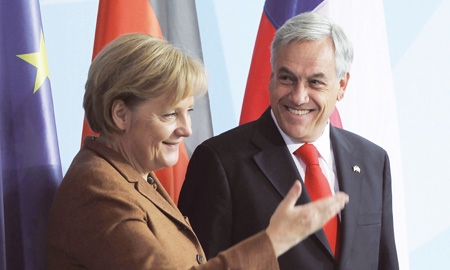This growth, a 5.9 per cent rise in gross domestic product (GDP) last year, did not come without persistent hard work over a decade of good economic management and continued political leadership within the South American country.
Chilean President Sebastián Piñera is currently focusing his economic agenda on boosting competitiveness and productivity as well as implementing social initiatives to combat poverty. He is striving for continued reform in healthcare, education and the labour market.
“Chile is a clear example of resistance and resilience to the rest of the world,” states Mr Piñera, making reference to his country’s ability to weather the world economic crisis that began in 2008.
In fact, at the height of the crisis, former president Michelle Bachelet infused the country with a $4 billion stimulus package, the largest in Latin America, allowing the nation to subsequently emerge as a strong economy, quickly experiencing growth.
“Chile is a clear example of resistance and resilience to the rest of the world.”
Sebastián Piñera, President of Chile
|
Much of Chile’s success is related to its free enterprise model, put in place because of its export-led economy. It is considered the freest country in Latin America and 11th among 179 countries worldwide.
Chile’s exports are one of the key engines of its economy, with trade and services representing 75 per cent of its GDP. The country leads the world in copper exports, often accumulating surpluses during high price years. In fact, the government’s Economic and Social Stabilisation Fund manages this surplus from the copper revenue to safeguard its economy and maintain social spending during moments of economic downturn. Other important exports include produce, wine, paper and chemicals.
Besides trade, Chile also leads within the Latin American economies for private business investment, financial market development, technological readiness, and communication infrastructure, among others.
“We have a solid and stable finance system, good telecommunications and clear rules that incentivise both investments and development,” says Christoph Schiess, President of Transoceánica, a leading private equity investment firm in Chile.
In January 2010, this Latin American country took further measures to increase its attractiveness to foreign investors by becoming part of the Organisation for Co-operation and Development (OECD), which insures that member countries meet international business standards such as corporate responsibility and greater banking transparency.
Indeed, the steps taken by the Chilean government to establish a stable environment for investments has generated trust among countries worldwide and allowed foreign direct investments (FDI) to reach record levels. In the first half of 2012, FDI increased by 80 per cent compared to the same period last year.
The United States is by far the largest investor in Chile at 24.6 per cent, followed by Spain at 19 per cent and Canada at 18 per cent.
Mining and electricity form a significant portion of the sectors with the most FDI with 34 per cent and 18 per cent respectively.
European countries are beginning to take a major interest in the investment opportunities in the South American country. Recently the Portuguese agribusiness company Sugalidal invested $45 million in Chile. One of the most up-and-coming investors in Chile is Germany, an increasingly important player in the agricultural industry as well as the mining and infrastructure sectors.
For Germany and many other economically powerful countries, Chile is an important gateway to the Latin American market. Many international companies have established their headquarters in Santiago, both a prominent cultural centre and ranked the number one city in the region for doing business.
“Chile is transforming in an appealing manner into a platform to centralise business in all South America, including Brazil,” says Mr Schiess. “Chile should be the Singapore of South America.”

0 COMMENTS